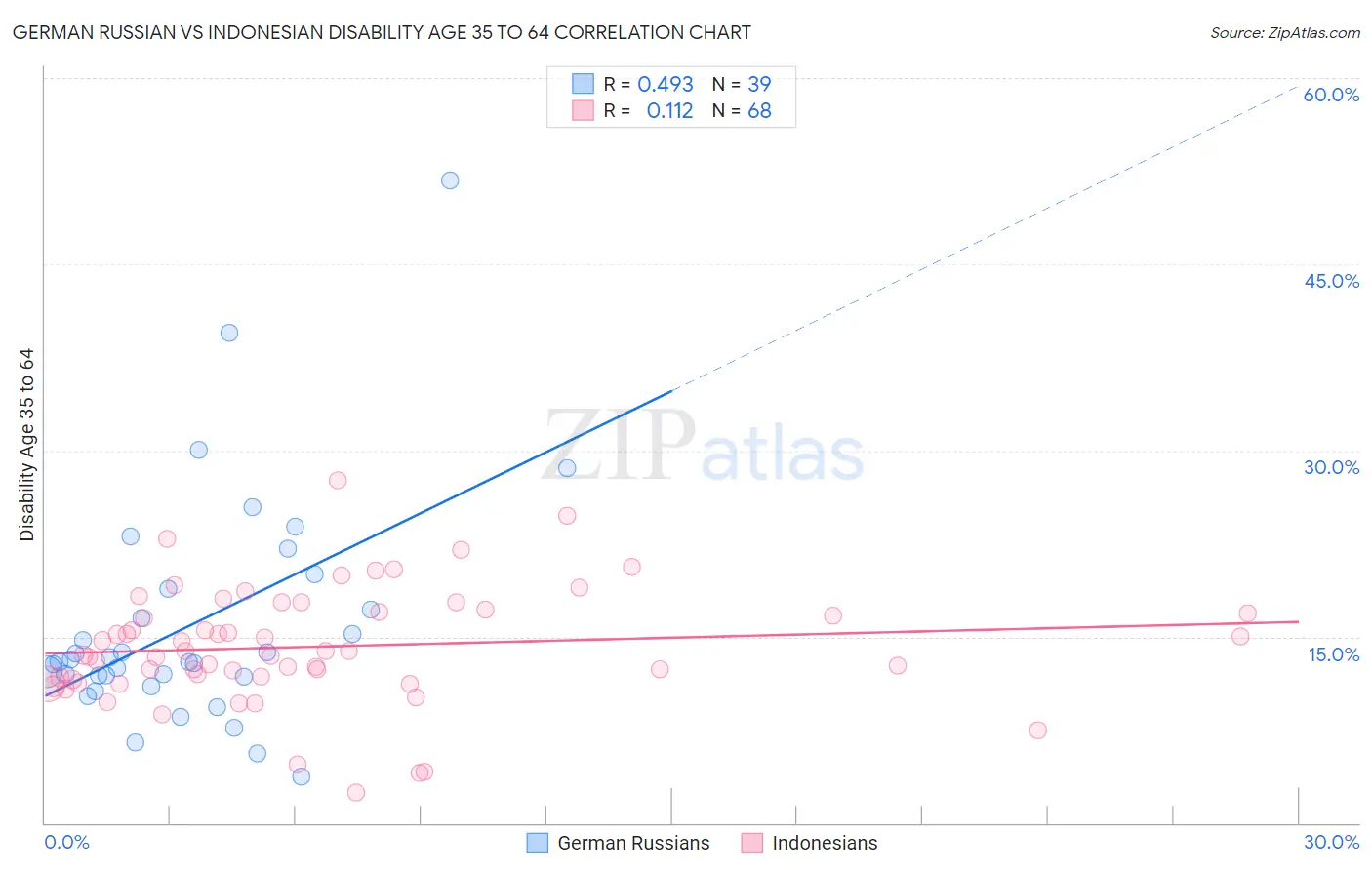German Russian vs Indonesian Disability Age 35 to 64
COMPARE
German Russian
Indonesian
Disability Age 35 to 64
Disability Age 35 to 64 Comparison
German Russians
Indonesians
12.5%
DISABILITY AGE 35 TO 64
0.5/ 100
METRIC RATING
260th/ 347
METRIC RANK
13.2%
DISABILITY AGE 35 TO 64
0.0/ 100
METRIC RATING
289th/ 347
METRIC RANK
German Russian vs Indonesian Disability Age 35 to 64 Correlation Chart
The statistical analysis conducted on geographies consisting of 96,440,247 people shows a moderate positive correlation between the proportion of German Russians and percentage of population with a disability between the ages 34 and 64 in the United States with a correlation coefficient (R) of 0.493 and weighted average of 12.5%. Similarly, the statistical analysis conducted on geographies consisting of 162,649,363 people shows a poor positive correlation between the proportion of Indonesians and percentage of population with a disability between the ages 34 and 64 in the United States with a correlation coefficient (R) of 0.112 and weighted average of 13.2%, a difference of 6.2%.

Disability Age 35 to 64 Correlation Summary
| Measurement | German Russian | Indonesian |
| Minimum | 3.7% | 2.5% |
| Maximum | 51.7% | 27.6% |
| Range | 48.0% | 25.1% |
| Mean | 16.0% | 14.2% |
| Median | 13.0% | 13.7% |
| Interquartile 25% (IQ1) | 11.8% | 11.6% |
| Interquartile 75% (IQ3) | 18.8% | 17.1% |
| Interquartile Range (IQR) | 7.1% | 5.5% |
| Standard Deviation (Sample) | 9.2% | 4.7% |
| Standard Deviation (Population) | 9.1% | 4.6% |
Similar Demographics by Disability Age 35 to 64
Demographics Similar to German Russians by Disability Age 35 to 64
In terms of disability age 35 to 64, the demographic groups most similar to German Russians are Malaysian (12.5%, a difference of 0.15%), Senegalese (12.5%, a difference of 0.23%), English (12.4%, a difference of 0.25%), Welsh (12.4%, a difference of 0.37%), and Mexican (12.4%, a difference of 0.46%).
| Demographics | Rating | Rank | Disability Age 35 to 64 |
| Dutch | 1.0 /100 | #253 | Tragic 12.3% |
| Hawaiians | 0.9 /100 | #254 | Tragic 12.3% |
| Japanese | 0.8 /100 | #255 | Tragic 12.3% |
| Scottish | 0.8 /100 | #256 | Tragic 12.4% |
| Mexicans | 0.7 /100 | #257 | Tragic 12.4% |
| Welsh | 0.6 /100 | #258 | Tragic 12.4% |
| English | 0.6 /100 | #259 | Tragic 12.4% |
| German Russians | 0.5 /100 | #260 | Tragic 12.5% |
| Malaysians | 0.5 /100 | #261 | Tragic 12.5% |
| Senegalese | 0.5 /100 | #262 | Tragic 12.5% |
| Immigrants | Zaire | 0.4 /100 | #263 | Tragic 12.5% |
| Immigrants | Portugal | 0.4 /100 | #264 | Tragic 12.5% |
| Marshallese | 0.4 /100 | #265 | Tragic 12.5% |
| Whites/Caucasians | 0.3 /100 | #266 | Tragic 12.6% |
| Sub-Saharan Africans | 0.2 /100 | #267 | Tragic 12.6% |
Demographics Similar to Indonesians by Disability Age 35 to 64
In terms of disability age 35 to 64, the demographic groups most similar to Indonesians are Fijian (13.2%, a difference of 0.070%), Immigrants from Liberia (13.2%, a difference of 0.080%), Tlingit-Haida (13.2%, a difference of 0.42%), Immigrants from Congo (13.3%, a difference of 0.59%), and Puget Sound Salish (13.3%, a difference of 0.64%).
| Demographics | Rating | Rank | Disability Age 35 to 64 |
| Immigrants | Laos | 0.1 /100 | #282 | Tragic 13.0% |
| Central American Indians | 0.0 /100 | #283 | Tragic 13.0% |
| Immigrants | Nonimmigrants | 0.0 /100 | #284 | Tragic 13.0% |
| Immigrants | Somalia | 0.0 /100 | #285 | Tragic 13.1% |
| Hmong | 0.0 /100 | #286 | Tragic 13.1% |
| Tlingit-Haida | 0.0 /100 | #287 | Tragic 13.2% |
| Fijians | 0.0 /100 | #288 | Tragic 13.2% |
| Indonesians | 0.0 /100 | #289 | Tragic 13.2% |
| Immigrants | Liberia | 0.0 /100 | #290 | Tragic 13.2% |
| Immigrants | Congo | 0.0 /100 | #291 | Tragic 13.3% |
| Puget Sound Salish | 0.0 /100 | #292 | Tragic 13.3% |
| Ute | 0.0 /100 | #293 | Tragic 13.4% |
| Yaqui | 0.0 /100 | #294 | Tragic 13.5% |
| Yakama | 0.0 /100 | #295 | Tragic 13.6% |
| Africans | 0.0 /100 | #296 | Tragic 13.6% |